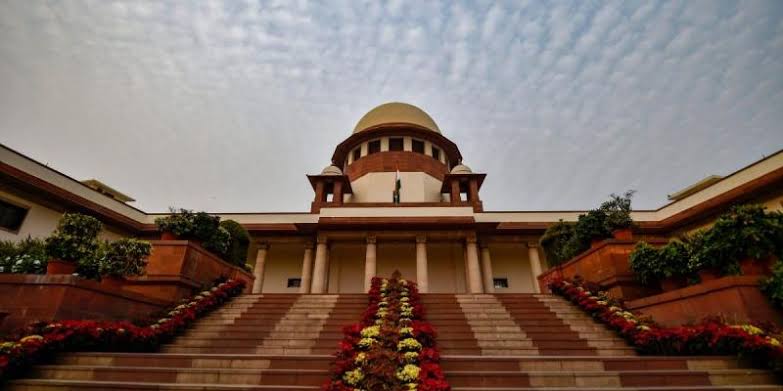The Supreme Court has observed that Judges should refrain from passing oral direction, particularly in criminal matters, as it is not acceptable.
The Division bench of Justices D.Y. Chandrachud and M.R. Shah held on August 31 that the procedure of issuing oral directions only opens the door to ‘serious misgivings’ and ‘grave abuse’ with a loss in judicial accountability.
The apex court made the observation, while noting that a Single-Judge Bench of Gujarat High Court had passed an oral direction not to arrest an accused in a forgery case.
“Judges speak through their judgments and orders. The written text is capable of being assailed. The element of judicial accountability is lost, where oral regimes prevail. This would set a dangerous precedent and is unacceptable. Judges, as much as public officials over whose conduct they preside, are accountable for their actions,” the Bench noted.
The Court made the observation while hearing an appeal filed by Salimbhai Hamidbhai Menon, who had approached the High Court under Section 482 of the Criminal Procedure Code, seeking quashing of FIR lodged against him under sections 405 (criminal breach of trust), 420 (cheating), 465 (forgery), 467 (forgery of valuable security), 468 (forgery for the purpose of cheating) and 471 (using as genuine a forged document or electronic record) of the Indian Penal Code.
The case was related to two Vadodara-based individuals, who agreed to a firm partnership and subsequently fell out over allegations of forged documents. An FIR was filed before a Vadodara police station in July, 2020 by one of the partners Nitesh Kumar Patel against other partner Salimbhai Memon.
Investigation revealed that it was Patel, who had forged the document. A second FIR was filed in December 2020 against Patel by Memon. Patel moved the Gujarat High Court, seeking quashing of second FIR. On March 8, Patel was arrested and the next day, the Gujarat HC issued an oral direction restraining Patel’s arrest and directed that Patel be released if he was arrested. Memon, approached the top court of the country, challenging the Gujarat HC’s oral direction of granting Patel protection from arrest.
During the pendency of the matter in the High Court, Menon was arrested. When the proceedings were taken up after the arrest, the High Court was of the view that an opportunity should be granted to the Counsel for the parties to explore the possibility of a settlement and on that ground, an interim protection against arrest was granted.
The apex court in the Appeal noted that the text of the order of the High Court did not contain any direction restraining the arrest of the accused. If the High Court thought it fit to grant an interim protection against arrest, a specific judicial order to that effect was necessary, observed the Court.
The apex court said in absence of a judicial order, the investigating officer would have no official record emanating from the High Court on the basis of which a stay of arrest is enforced. The top court said administration of criminal justice is not a private matter between the complainant and the accused, but implicates wider interests of the State in preserving law and order as well as a societal interest in the sanctity of criminal justice administration.
“Absent a written record of what has transpired in the course of a judicial proceeding, it would set a dangerous precedent if the parties and the investigating officer were expected to rely on unrecorded oral observations,” the judgment said.
The Court reasoned, “Oral directions of this nature by the High Court are liable to cause serious misgivings. Such a procedure is open to grave abuse… it would set a dangerous precedent if the parties and the investigating officer were expected to rely on unrecorded oral observations… In criminal proceedings, apart from the accused and the complainant, there is a vital interest of the State and of society in the prosecution of crime… Judges, as much as public officials over whose conduct they preside, are accountable for their actions.”
The Bench referred to the case of In Parbatbhai Aahir alias Parbatbhai Bhimsinhbhai Karmur vs State of Gujarat, in which the apex court formulated the governing principles to guide the exercise of powers under Section 482 of the CrPC.
The Court observed that while there may be some cases where the initiation of criminal proceedings may be an abuse of law, it is in cases of an exceptional nature, where it is found that absence of interference would result in a miscarriage of justice, that the Court may exercise its jurisdiction under Section 482 of CrPC and Article 226 of the Constitution.
Also Read: National Board of Examination to allow change of centre to 2 pregnant women for NEET-PG exams
The Court had disapproved of interim orders of High Courts which grant stay of arrest or which direct that no coercive steps must be taken against the accused, without assigning reasons. The impugned order of the High Court cannot be sustained on the touchstone of the principles which have been consistently laid down by this Court and reiterated in the of In Parbatbhai Aahir alias Parbatbhai Bhimsinhbhai Karmur v. State of Gujarat case.
“We are conscious of the fact that in the present case, the petition for quashing is still pending before the High Court. At the same time, the High Court was moved for the grant of ad interim relief in a petition for quashing the FIR. The considerations, which ought to weigh in whether or not to exercise the jurisdiction to quash, must be present in the mind of the Judge while determining whether an interim order should be made. That these considerations have been borne in mind can only be evident from the reasons, however brief, which have been indicated in the order of the High Court. This does not emerge from the order of the High Court,” observed the Bench, while allowing the appeal.


